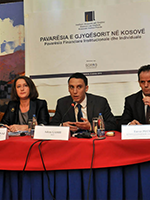November 6, 2012 – Kosovo Law Institute (KLI) with the support of Kosovo Foundation for Open Society (KFOS) today held the roundtable “Financial Independence of Judicial Power”. Participants in the panel moderated by Mr. Adem Gashi, were Mr. Enver Peci, Kosovo Judicial Council, Ms. Safete Hadergjonaj, Parliamentary Commission on Budget and Finance, Mr. Daut Xhemajli, Ministry of Justice, and Mr. Betim Musliu, Kosovo Law Institute. During this roundtable, Betim Musliu from KLI presented the report: “Independence of the Judiciary in Kosovo: Analysis of Institutional and Individual Financial Independence”. Musliu said that this report is a result of the need for in depth study of the lack of efficiency in judicial power over the years, mainly due to the lack of financial and human resources.
This analysis was built, seeing the lack of various resources that impact on the efficiency of the judiciary and reviewing the fulfillment of these conditions against international and European standards such as the United Nations Basic Principles on Judicial Independence, Recommendation of the Council of Ministers of the Council of Europe on Judges, European Charter of Statute of Judges, and other relevant documents”.
Musliu said that the efficiency, impartiality and independence of the judiciary are not an end in itself but represent a basic condition to ensure that the rights and freedoms of individuals are realized, implemented and protected in a reasonable time by an independent and impartial court and judge. “The violation of the independence of the Judiciary is considered any act of the Executive or Legislative which undermines the efficiency of the work of the judiciary as a result of the scarce resources allocated to the judiciary. Therefore, the budget for the judiciary, which has consistently been shortened by two other powers, should be increased and the budget proposal for the judiciary should be amended by law, in order for the proposal to be made directly in the Assembly, without intervention of the Government”.
Head of KJC, Mr. Enver Peci said that the findings of the report are realistic and that the necessary financial support would contribute in improving the overall working conditions and greater independence of the judiciary. “We know that there are problems due to Kosovo’s small budget, but other powers should better understand the needs of the judiciary in order to build an efficient judicial system, in the service of citizens for the best possible access to justice and the solution of their cases”. Peci said that now the judiciary has entered a reform, where it is foreseen to be the restructuring the current courts.
“All these important processes should be followed with the necessary financial support, otherwise the reform process will be impeded and the expected success will be questioned”.
The President of the Commission on Budget and Finance, Ms. Safete Hadergjonaj, disagreed with some of the findings of the report, insisting that budget appropriations for the judiciary by the Assembly are made depending on how the judiciary can justify its budget requirements. “The KJC as well as any other institution is appropriately addressed to the Budget Commission and all those requests that are reasonably justified are supported. In this case the KJC has always been supported in their reasonable demands.
However, the KJC needs to increase its capacities so that planning and spending can be done properly and not as they have done so far, because there was no planning and spending properly”. Deputy Minister of Justice, Daut Xhemajli, said that the Ministry of Justice has constantly tried to play its part in drafting policies and laws in support of the judiciary to provide better services to citizens. “We have always tried to help the judiciary. Currently there are many investments being made and here we should mention the construction of the Palace of Justice, which is funded by the Government of Kosovo together with the European Commission. So, these are investments to create better working conditions for the judiciary”. Numerous participants at this roundtable discussed on the findings and recommendations of the KLI report, while representatives of all three powers have welcomed them and have pledged that they will be reflected in their work.

